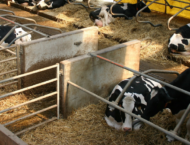This brief post is meant to be the second one of a discussion series about sustainability without mentioning this word. Our main goal is to be highly efficient and good managers on our dairy farms, before making major investments.
Last time, we had a story to tell about good manure quality. We saw how feeding calves with milk rejected from the tank due to withdrawal periods is not a good option both for calves’ health and chemical and microbiological characteristics of soils when spreading.
What about crop productivity? A proper waste management and a good quality manure can help us give the right boost to our crops.
As dairy farmers, we rely on homegrown crop production. This is a great opportunity to dispose of the waste produced by our dairy cows using it as a fertilizer to meet nutritional demand of crops. Also, it is a good opportunity for the economic optimization of our own entire dairy system.
A recent meta-analysis1 assessed more than fifty scientific studies to compare the use of dairy manure with synthetic fertilizer.
This meta-analysis showed that, when applied at rates providing equivalent levels of plant-available nitrogen content, the effects of dairy manure on crop production, quality, and digestibility were positively equal to those achieved with synthetic fertilizer.
In particular, manure application increased soil organic matter, with a suggested overall positive impact on long term-fertility. The meta-analysis reported a high variability across the studies for soil nitrate leaching and nitrous emissions, concluding that no clear trends were evident.
An increase in soil phosphorous with a potential threat to water quality may be a risk related to dairy manure application.
The good thing is that, if applied with care to limit above impacts, dairy manure is a suitable fertilizer. It is worth noting that these impacts can vary with site-specific factors (climate, soil type, and application procedures).
Now, let’s go back to the antibiotic issue. A proper management of antibiotics in dairy cows is important for our crops, as well. Dairy manure can introduce chemicals (antibiotics) and pathogens (yes, including resistant strains from calves). How do antibiotics impact the soil, in short?
Depending on a number of different factors (physical and chemical properties of the substance, climatic factors, characteristics of the soil) persistence of antibiotic residues in the soil is determined mainly by sorption to organic particles and degradation/transformation.
The effects on soil microorganisms are the change in their enzyme activity and ability to metabolize different carbon sources and an alteration of the microbial biomass and heterogeneity of microbial communities.
Soil biodiversity plays an important role in ecological processes, and this is true especially for microorganisms, most importantly for their positive role in the maintenance of soil and water quality.
Thus, we owe our crops and our fields a good waste management and rational antibiotic use – it is beneficial for us first! Now, let’s go over good manure spreading:
- never forget about local and national relevant rules on manure application to soil;
- know the nature and characteristic of the soil – it helps avoid water pollution;
- be sure to maintain non-spread zone near vulnerable areas – water sources, settlements, etc.;
- highly fertile soils do not need high quantity of fertilizer;
- consider proper weather and soil conditions for the application;
- pay attention to timing and level of application on heavy or impermeable soils, areas subject to flooding and sloped grounds.

1 Peter L. O’Brien and Jerry L. Hatfield. Dairy Manure and Synthetic Fertilizer: A Meta-Analysis of Crop Production and Environmental Quality. Agrosyst. Geosci. Environ. 2:190027 (2019) doi: 10.2134/age2019.04.0027





















